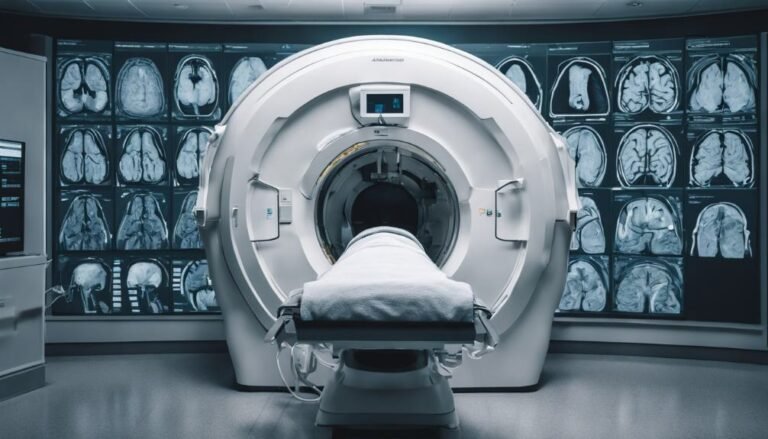AI for Biomarker Discovery
In the domain of biomarker discovery, AI functions as a silent orchestrator, unraveling intricate patterns hidden within vast data landscapes that might otherwise remain obscured. The marriage between artificial intelligence and biomarker identification holds promise for reshaping the landscape of healthcare and medical research, ushering in an era of precision and personalized medicine. With the power of AI at your disposal, the potential for uncovering novel biomarkers that could revolutionize diagnostics and treatments seems limitless.
Key Takeaways
- AI efficiently analyzes vast datasets for biomarker discovery.
- Machine learning algorithms identify patterns for potential biomarkers.
- Data-driven selection ensures statistical significance in biomarker identification.
- Predictive modeling with AI enhances accuracy in biomarker prediction.
- AI assists in feature selection techniques for robust biomarker discovery.
Role of AI in Biomarker Discovery
AI plays a pivotal role in biomarker discovery by efficiently analyzing vast datasets and identifying patterns that may not be readily apparent to human researchers. Through the utilization of AI algorithms, the process of biomarker discovery is revolutionized. Big data, which encompasses a large volume and variety of data sources, is effectively handled by AI algorithms to uncover potential biomarkers. These algorithms can sift through immense amounts of information in a fraction of the time it would take a human researcher. This capability is particularly vital in biomarker discovery, where the identification of subtle correlations and trends within complex datasets is essential.
Furthermore, AI contributes significantly to biomarker validation. By cross-referencing different datasets and applying sophisticated algorithms, AI can verify the reliability and accuracy of potential biomarkers. This validation step is critical in ensuring that the identified biomarkers are truly indicative of the biological processes or conditions they're meant to represent. The speed and efficiency with which AI can perform these tasks make it an indispensable tool in the field of biomarker discovery.
Machine Learning in Biomarker Identification
You'll explore how data-driven biomarker selection methods can enhance the accuracy and efficiency of biomarker identification processes.
Predictive modeling approaches offer a systematic framework to analyze complex datasets and uncover potential biomarkers with high predictive power.
Feature selection techniques play an essential role in narrowing down the most relevant biomarkers from a pool of potential candidates, aiding in the development of precise diagnostic or prognostic tools.
Data-Driven Biomarker Selection
Utilizing machine learning algorithms in biomarker identification enables the data-driven selection of biomarkers with enhanced accuracy and efficiency. In this process, biomarker classification is achieved through the evaluation of feature importance. Machine learning algorithms can rank the relevance of different features in distinguishing between various biological conditions.
Statistical significance plays a vital role in this selection, ensuring that the identified biomarkers aren't due to random chance but are indeed indicative of the condition being studied.
Validation methods are essential in confirming the robustness of the selected biomarkers. Techniques such as cross-validation, bootstrapping, and external validation on independent datasets help assess the generalizability of the identified biomarkers.
These methods provide confidence that the selected biomarkers aren't overfitting the training data and can accurately predict the biological condition in new samples. By incorporating these principles, data-driven biomarker selection using machine learning approaches can lead to the discovery of reliable and impactful biomarkers for various applications in healthcare and research.
Predictive Modeling Approaches
In predictive modeling approaches for biomarker identification, machine learning algorithms play an essential role in analyzing data to identify potential biomarkers with high accuracy and efficiency.
Feature importance analysis is a critical step in understanding which biomarkers have the most significant predictive power. By utilizing various algorithms such as Random Forest, Support Vector Machines, or Gradient Boosting, researchers can compare their performance and choose the most appropriate one for the dataset.
To prevent overfitting, it's important to tune the model parameters carefully. This process involves adjusting hyperparameters like learning rate, tree depth, or regularization strength to optimize the model's performance on unseen data. Overfitting prevention ensures the model generalizes well and isn't overly tailored to the training data.
Algorithm comparison and model tuning are iterative processes that require a deep understanding of the data and the underlying biology. By employing these techniques effectively, researchers can develop robust predictive models for biomarker discovery.
Feature Selection Techniques
To further enhance the efficacy of biomarker identification through machine learning, the focus shifts towards exploring Feature Selection Techniques as a pivotal step in the process.
Feature selection plays an essential role in improving model performance by identifying the most relevant variables while excluding irrelevant or redundant ones. In the domain of biomarker discovery, employing statistical methods such as t-tests, ANOVA, or correlation analysis aids in selecting features that exhibit significant differences across different groups or conditions.
Feature engineering is another key aspect that involves transforming raw data into informative features to enhance the model's predictive power. Techniques like PCA (Principal Component Analysis) or LDA (Linear Discriminant Analysis) can be utilized to create new features that capture the underlying patterns in the data efficiently.
Deep Learning for Biomarker Prediction
You'll explore the critical aspects of model performance evaluation and data preprocessing techniques when utilizing deep learning for biomarker prediction.
Understanding how to assess the performance of deep learning models in predicting biomarkers is vital for optimizing their accuracy and reliability.
Additionally, effective data preprocessing techniques play a pivotal role in enhancing the quality of input data and improving the overall performance of biomarker prediction models.
Model Performance Evaluation
When evaluating the performance of deep learning models for biomarker prediction, it's essential to employ rigorous methodologies to ensure accuracy and reliability in the results. Utilizing cross-validation methods such as k-fold cross-validation helps in evaluating the model's generalizability by splitting the data into training and validation sets multiple times. Evaluation metrics like accuracy, precision, recall, and F1 score provide insights into the model's performance across different aspects of biomarker prediction.
In deep learning, achieving a balance between bias and variance is important. The bias-variance tradeoff indicates the need to find a model that's complex enough to capture the underlying patterns in the data without overfitting.
Hyperparameter tuning plays a significant role in optimizing model performance by adjusting parameters like learning rate, batch size, and number of layers.
Data Preprocessing Techniques
Implementing various data preprocessing techniques is essential in the field of deep learning for biomarker prediction to enhance model performance and guarantee accurate results. Normalization techniques play an important role in standardizing the range of features, ensuring that each input variable contributes equally to the model training process. By scaling the data to a uniform range, normalization prevents certain features from dominating others, thereby improving the model's ability to learn effectively from the data.
Additionally, outlier detection is important in identifying and handling anomalies that may skew the model's predictions. Outliers can have a notable impact on the training process by introducing noise or bias that distorts the learning algorithm.
Data Mining Techniques for Biomarkers
Utilizing advanced data mining techniques is vital in the discovery and identification of biomarkers for various medical conditions. Biomarker classification plays a pivotal role in categorizing different types of biomarkers, such as diagnostic, prognostic, or predictive markers.
Association rule mining is a powerful data mining technique that can uncover interesting relationships and patterns within biomarker data sets.
When applying association rule mining to biomarker data, the algorithm identifies frequent itemsets, which are sets of biomarkers that often occur together. By analyzing these itemsets, researchers can discover significant associations between biomarkers and specific medical conditions. This process aids in identifying potential biomarkers that may be indicative of a particular disease or treatment response.
Moreover, association rule mining can assist in biomarker validation by confirming the relationships between biomarkers and medical conditions observed in the data. This validation step is essential in ensuring the reliability and accuracy of the identified biomarkers before further clinical testing or implementation.
Precision Medicine and AI
AI plays a pivotal role in advancing precision medicine by leveraging data-driven approaches to tailor medical treatment and interventions to individual patients.
Through personalized treatment, AI algorithms analyze vast amounts of patient data, including genomics, clinical records, lifestyle factors, and imaging results, to identify biomarkers that can predict a patient's response to specific therapies.
This level of patient stratification enables healthcare providers to offer targeted treatments that are more effective and have fewer side effects, ultimately improving patient outcomes.
Challenges in AI-driven Biomarker Discovery
Biomarker discovery through AI presents significant challenges in effectively translating complex data into actionable insights for personalized medicine. Two key obstacles in this domain are regulatory hurdles and ethical considerations.
Regulatory hurdles encompass the need for robust validation and standardization of AI algorithms used in biomarker discovery to guarantee their accuracy and reliability. Meeting regulatory requirements, such as those set by the FDA, can be a time-consuming and costly process, hindering the swift implementation of AI-driven biomarkers in clinical practice.
Ethical considerations also pose a significant challenge. AI algorithms must adhere to strict ethical guidelines to protect patient privacy, prevent bias in decision-making processes, and ensure transparency in how biomarker discoveries are made. Addressing issues related to data privacy, consent, and the potential misuse of sensitive information is paramount in integrating AI biomarkers into healthcare systems.
Balancing the innovative potential of AI in biomarker discovery with the ethical responsibilities towards patients is vital for the sustainable advancement of personalized medicine.
Clinical Applications of AI Biomarkers
The integration of AI-driven biomarkers into clinical practice revolutionizes diagnostic and prognostic approaches in personalized medicine. Biomarker applications empowered by AI are increasingly prevalent in various clinical trials, demonstrating their ability to enhance patient outcomes and streamline treatment strategies.
AI integration in biomarker analysis allows for the identification of subtle molecular patterns indicative of disease presence, progression, or treatment response, offering clinicians valuable insights for tailored patient care.
In clinical trials, AI biomarkers play a critical role in predicting treatment responses, stratifying patient populations, and monitoring disease progression with higher precision and efficiency than traditional methods. These AI-driven biomarkers provide a more nuanced understanding of individual patient profiles, enabling healthcare providers to deliver targeted interventions and optimize therapeutic outcomes in personalized medicine approaches.
As AI technologies continue to advance, the integration of biomarkers into clinical practice holds immense promise for improving patient care and driving innovation in healthcare delivery.
Future Trends in Biomarker Research
Emerging trends in biomarker research suggest a shift towards multi-omics approaches for thorough profiling of molecular signatures in various diseases. This evolution is driven by the increasing need for personalized medicine and the advancements in technology that enable in-depth analyses of multiple biological data types.
By integrating genomics, proteomics, metabolomics, and other -omics disciplines, researchers can uncover novel biomarkers that offer deeper insights into disease mechanisms and potential therapeutic targets.
The future of biomarker research lies in harnessing big data and artificial intelligence to identify complex patterns within multi-omics datasets. This analytical approach allows for the discovery of robust biomarker panels with high predictive accuracy, enhancing diagnostic capabilities and treatment outcomes.
Additionally, the integration of multi-omics data in biomarker studies has profound implications for precision medicine, enabling tailored interventions based on individual molecular profiles. As technology continues to advance, the field of biomarker research is poised to revolutionize clinical practice by providing clinicians with sophisticated tools for early disease detection and monitoring treatment responses.
Conclusion
To sum up, AI is revolutionizing biomarker discovery by efficiently analyzing vast datasets and identifying patterns that human researchers may overlook.
Through machine learning algorithms and data-driven approaches, AI enhances the accuracy and efficiency of biomarker identification, paving the way for personalized medicine and targeted interventions in healthcare.
As AI continues to transform biomarker research, the future holds promising advancements in precision medicine and clinical applications, ensuring better patient outcomes through innovative technology.







